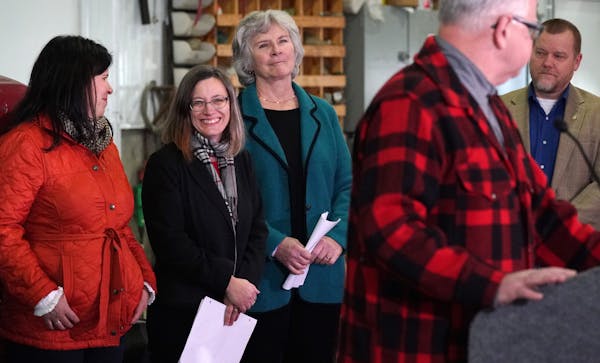The first female commissioner of the Department of Natural Resources is a problem solver, consensus builder, clean water champion, lake cabin owner and fishing enthusiast who vows to deepen the connections Minnesotans have to the outdoors.
Sarah Strommen, who was picked over incumbent Tom Landwehr to shepherd the state's land, lakes and wildlife, was appointed Thursday and will take control of the agency Monday after serving four years as an assistant DNR commissioner overseeing fishing, hunting, wildlife, state parks and trails.
"She's excellent at items of high concern,'' said Ramsey Mayor John LeTourneau. "She'll do great.''
Strommen, 46, preceded LeTourneau as mayor of that Anoka County suburb — a hands-on position that many say boosted her suitability to lead the DNR's 2,700 employees and $1.1 billion biennial budget. Gov.-elect Tim Walz said he had never met Strommen until he interviewed her for the job. He jettisoned Landwehr, a personal friend, to give Strommen the reins.
"She knows the ins and outs of the department,'' Walz said. "She spoke with a passion that spoke to me.''
Strommen is a new face to the general public, but she's been a natural resources professional in her home state for a decade. She was policy director at Friends of the BWCA; associate director at Minnesota Land Trust; and acting deputy director for the Minnesota Board of Water and Soil Resources, another state agency. She joined the DNR in 2015.
"She listens first and tries to understand,'' said Kris Larson, executive director of the Minnesota Land Trust. "But she's a doer. She gets things done.''
Gov. Mark Dayton leaned on Strommen to clean up polluted surface water in farm country by teaming her with others to develop his agricultural buffer strip initiative. She also has helped steer millions of special tax dollars to conservation projects as the DNR's liaison to the Lessard Sams Outdoor Heritage Council.
Larson said Strommen's intricate knowledge of state government translated into speedy work of high quality. "If she's got a superpower it's that she can suspend time,'' Larson said. "She gets so much done.''
On the home front, that includes weekends at the family cabin on Leech Lake, where her 12-year-old son hones skills useful to his Bassinators Junior Fishing Club. She recently caught perch with him on Leech Lake's ice. But Strommen said she was blanked on this year's family deer hunt in the rough and hilly Paul Bunyan State Forest.
"It's so much a part of my family and my family's experience,'' Strommen said of the outdoors. "I would say that angling is my first love.''
Two turns as mayor
Strommen grew up in St. Paul's Highland Park neighborhood, where her parents taught history at Macalester College. She spent five years at St. Paul Academy and graduated from St. Paul Central High School. She completed two years of postgraduate environmental work at Duke University and studied birds in Costa Rica under a Fulbright Scholarship.
In 2000, she and her husband, Jon Strommen, moved to Ramsey. She was drawn into local politics by challenging the city's plans for a housing development in their neighborhood.
That led to seven years on the City Council and two turns at mayor. LeTourneau said Strommen's ability to bring people together delivered Ramsey's first major transportation change in 65 years. It addressed congestion and safety on the city's all-important Hwy. 10 corridor. LeTourneau said the plan required a lot of listening to public concerns in atmospheres conducive to open discussion.
"City councils before her … would kick the can down the road,'' LeTourneau said.
Strommen was re-elected mayor but gave up her seat last May to move into the home in Plymouth where her husband grew up. The couple and their son have two dogs.
Strong support
Strommen's appointment was welcomed by Pheasants Forever, Minnesota Deer Hunters Association, Friends of the Boundary Waters, other conservation groups and leaders of natural resources committees in the state House and Senate.
Eran Sandquist, Minnesota state coordinator for Pheasants Forever, said the new commissioner comes from a strong conservation background and has always relied on science to guide her decisions.
Craig Engwall, executive director of the Minnesota Deer Hunters Association, said he remembers when Strommen stepped in more than a year ago to appease hunters rankled by a lack of transparency in the DNR.
"There was a lot of frustration. … She was very good about making sure they would communicate better,'' Engwall said.
State Sen. Bill Ingebrigtsen, R-Alexandria, and state Rep. Rick Hansen, D-South St. Paul, both contacted Strommen to personally congratulate her. The two men chair Senate and House committees that decide policy and funding related to natural resources.
"I think Minnesotans are going to like her,'' Hansen said. "She'll bring her ideas and her skills and her problem solving.''
Starting Monday, the state's 500,000 deer hunters will look to her for answers on how to stop the spread of chronic wasting disease in deer. She also inherits a high-stakes battle over proposed copper-nickel mining on the edge of the BWCA and faces worrisome declines in hunting and fishing participation.
"If hunters and anglers decline, who is going to fund our conservation work?'' Strommen said. "Even more broadly, who is going to care if people don't have that connection'' to the outdoors?

Wolves, Suns needed time after making big trades
Olympic torch makes Acropolis overnight stop a week before handover to Paris organizers
Mario Andretti offended by F1 rejection. 'If they want want blood, well, I'm ready,' says 1978 champ

